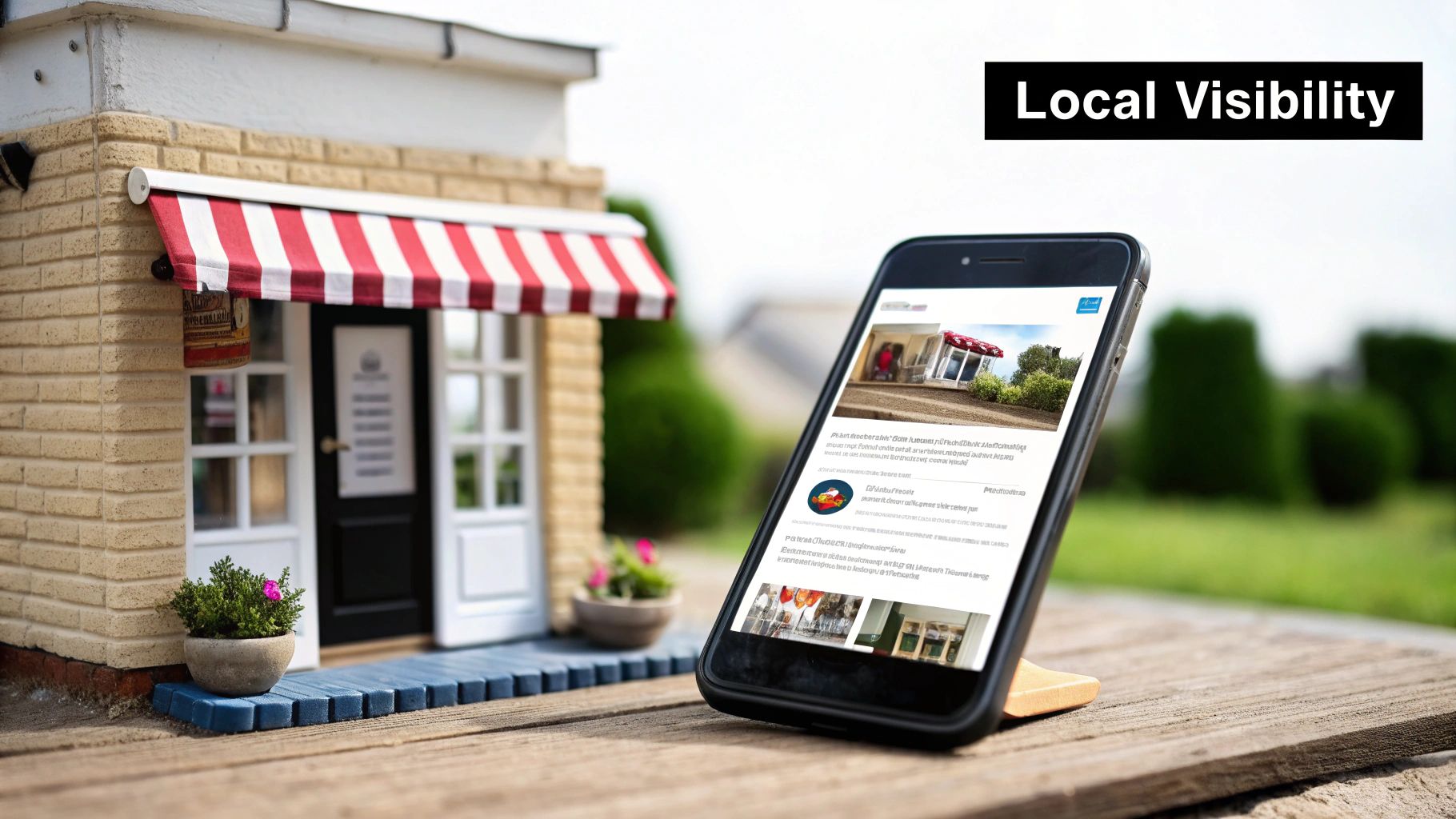In the competitive digital landscape of Norfolk and Suffolk, standing out online is more critical than ever. For a small or medium-sized enterprise, a strong online presence is not just a ‘nice to have’; it is the engine of growth, driving visibility, attracting local customers, and building a sustainable future. However, navigating the complexities of search engine optimisation (SEO) can feel daunting. Generic advice often misses the mark, failing to address the unique challenges and opportunities within our local East Anglian market.
This guide cuts through the noise. We are not just offering vague suggestions; we are providing a detailed roadmap with eight specific, actionable SEO tips for small businesses designed to deliver tangible results. From optimising your Google Business Profile to building high-quality local backlinks and mastering schema markup, each point is crafted to be immediately useful. Whether you are a retailer in Diss, a service provider in Norwich, or a cafe in Ipswich, these strategies will help you connect with your community, dominate local search results, and turn online interest into real-world success. Let’s explore how to make your business the local go-to choice, starting today.
1. Optimise Google Business Profile: Your Digital Front Door
Your Google Business Profile (GBP) is arguably the most powerful free tool for local SEO. It is what potential customers see when they search for businesses like yours on Google Search and Maps. For an East Anglian business, a fully optimised profile acts as your digital storefront, providing crucial information like your address in Diss, your opening hours in Norwich, and customer reviews from across Suffolk. It's the first impression for many, making its accuracy and completeness non-negotiable.

When customers search for "plumbers in Ipswich" or "cafes near Cambridge," the results they see are dominated by the local map pack, powered by GBP. This prominence makes it one of the most vital SEO tips for small businesses looking to capture local customers at the exact moment they are ready to buy. A well-maintained profile directly influences your visibility, credibility, and ultimately, your footfall and phone calls.
How to Maximise Your GBP Impact
Success with GBP comes from treating it as an active marketing channel, not a static listing. Consider a Norfolk farm shop that saw a 50% increase in weekend footfall after optimising their GBP with seasonal produce photos and events. Likewise, a Suffolk-based plumbing service could receive three times more emergency calls directly through the 'click-to-call' button on their profile.
Here are actionable steps to take:
- 100% Completion: Fill out every single section Google provides. This includes services, attributes (like "wheelchair accessible"), and a detailed business description.
- Visual Appeal: Regularly upload high-resolution, recent photos of your premises, products, and team. This helps customers visualise the experience.
- Review Management: Make it a policy to respond to every review, both positive and negative, ideally within 24 hours. This shows you value customer feedback.
- Weekly Posts: Use the GBP Posts feature at least once a week to announce sales, share news, or highlight a product. This keeps your profile fresh and engaging.
- NAP Consistency: Ensure your Name, Address, and Phone number (NAP) are identical across your website and all other online directories. This is a critical local search ranking factor.
2. Focus on Local Keywords and Long-tail Keywords
Attempting to rank for broad, highly competitive keywords like "accountant" is a monumental task for a small business. Instead, the focus should be on local and long-tail keywords: specific, detailed search phrases that signal a much higher intent to purchase. For an East Anglian business, this is the difference between shouting into a void and having a direct conversation with a ready-to-buy customer in your local area. This is one of the most effective SEO tips for small businesses because it attracts qualified traffic that is far more likely to convert.

When a user searches for “accountant for small business in Norwich” or “emergency roof repair near King's Lynn,” they aren't just browsing; they have a specific, urgent need. By targeting these phrases, you position your business as the direct solution. This strategy allows you to sidestep competition from national giants and become the go-to expert in your immediate service area, whether that's Cambridge, Peterborough, or a smaller village in the Fens. Mastering these local SEO solutions is fundamental to capturing this high-value audience.
How to Target Local and Long-tail Keywords
Success comes from understanding how your local customers think and search. A boutique in Bury St Edmunds could see a surge in online orders by ranking for "handmade jewellery Bury St Edmunds," while a garage in Great Yarmouth might dominate local bookings by targeting "classic car MOT Great Yarmouth." It’s about being specific and relevant.
Here are actionable steps to find and use these keywords:
- Be Location-Specific: Naturally weave your town, city, and county (e.g., Suffolk, Norfolk, Cambridgeshire) into your website's page titles, headings, and body content.
- Think 'Near Me': Optimise for "near me" searches by ensuring your location is clearly stated on your contact page and your GBP is fully updated. Google uses proximity for these results.
- Use Keyword Tools: Leverage free tools like Google Keyword Planner or AnswerThePublic to find what questions your customers are asking. Look for longer, more conversational phrases.
- Focus on Buyer Intent: Prioritise keywords that signal someone is ready to buy, such as "quote," "cost," "service," or "for hire."
- Create Local Landing Pages: If you serve multiple towns, like Ipswich and Colchester, create dedicated pages for each. This allows you to tailor content and keywords specifically to that audience.
3. Create High-Quality, Locally-Relevant Content
Beyond your website's core pages, creating valuable, locally-focused content is one of the most effective SEO tips for small businesses. This strategy, often called content marketing, involves producing articles, guides, and resources that answer the specific questions and address the unique needs of your local customers. For an East Anglian business, this means moving beyond generic advice and becoming the go-to local authority in your niche.

When a homeowner in Norwich searches for "how to prepare my boiler for winter," they are far more likely to trust and contact a local heating engineer whose blog post answers that exact question with regional context. This approach builds trust, establishes your expertise, and provides Google with fresh, relevant content to rank. It positions you not just as a service provider, but as a helpful local resource, which is invaluable for long-term customer relationships.
How to Maximise Your Content's Impact
Success in content marketing comes from a deep understanding of your local audience. Consider a Cambridge-based law firm that writes about recent changes to tenancy laws in Cambridgeshire, attracting landlords and tenants looking for specific advice. Similarly, a local gym in Bury St Edmunds could create workout videos filmed at popular local parks, like the Abbey Gardens, connecting fitness with familiar community spaces.
Here are actionable steps to take:
- Answer Customer Questions: Create content based on the real questions you get every day. Think about what your customers ask on the phone or in person, and turn those answers into detailed blog posts or FAQ pages.
- Showcase Local Expertise: Write about local events, community news, or how regional factors impact your industry. This firmly roots your business in the local area.
- Use Local Landmarks: Referencing well-known places like the Norfolk Broads or the Suffolk Coast in your content makes it more relatable and signals local relevance to search engines.
- Create 'How-To' Guides: Develop practical guides related to your services. For example, a local garden centre could create a guide to "Planting a Bee-Friendly Garden in Essex." To dig deeper into how content helps you rank higher on google.co.uk, explore more detailed strategies.
- Feature Customer Stories: Develop case studies or testimonials from local customers. This provides powerful social proof and showcases your work within the community.
4. Build Local Citations and NAP Consistency
Beyond your Google Business Profile, your digital footprint extends across a vast network of online directories, apps, and websites. These mentions, known as local citations, are simply online references to your business's Name, Address, and Phone number (NAP). For a small business in East Anglia, having your details listed correctly on sites like Yelp, TripAdvisor, or a local Cambridgeshire business directory is a powerful signal to search engines that you are a legitimate, established local entity.

Inconsistent information creates confusion for both Google and potential customers. If one directory lists your Peterborough office with an old phone number and another has a slightly different postcode, it erodes trust and damages your local search ranking. Therefore, ensuring your NAP is 100% consistent everywhere it appears is one of the most fundamental SEO tips for small businesses seeking to dominate their local market. It’s the digital equivalent of ensuring all your signposts point correctly to your front door.
How to Achieve NAP Perfection
Think of citation building as a foundational task. A local B&B in Southwold listed accurately on booking sites and local tourism boards will invariably rank higher than a competitor with scattered, incorrect details. Likewise, an IT support firm in Norwich with consistent listings across tech directories will appear more credible and authoritative to search engines. The goal is to build a web of trustworthy, identical information about your business.
Here are actionable steps to build and maintain your citations:
- Start with the Giants: Ensure your NAP is perfect on the most critical platforms first: Google, Bing, Apple Maps, and Facebook. These are the cornerstones of your local presence.
- Audit and Clean Up: Use a tool like BrightLocal or Moz Local to audit your existing citations. Find and correct any inconsistencies, outdated addresses, or incorrect phone numbers immediately.
- Focus on Relevance: Prioritise high-quality, industry-specific directories. A law firm should be on FindLaw, while a builder in Essex would benefit from a listing on Checkatrade.
- Establish a Golden Record: Decide on one exact format for your name, address, and phone number (e.g., "Street" vs. "St.") and use it without deviation everywhere.
- Go Beyond NAP: Where possible, add more detail to your listings, such as your website URL, business hours, and a description of services to provide richer information.
5. Optimize Website for Mobile and Page Speed
In today's digital landscape, your website's performance on a mobile device is no longer optional; it's essential. With the majority of local searches, from finding a restaurant in Bury St Edmunds to a solicitor in Colchester, happening on smartphones, a slow or clunky mobile site can be a major roadblock for potential customers. Mobile optimisation and page speed are critical ranking factors for Google, directly impacting user experience and, ultimately, your ability to convert visitors into clients.
For an East Anglian small business, this means a potential customer waiting for your menu to load on their phone in a Norwich city centre car park will likely give up and go to a competitor if it takes too long. This is why optimising your site's performance is one of the most crucial SEO tips for small businesses. A fast, responsive website reduces bounce rates, improves your search engine rankings, and provides a seamless experience that encourages engagement and sales.
How to Boost Your Mobile and Speed Performance
Success in this area directly translates to better business outcomes. Imagine a local pizza shop in Peterborough seeing a 40% increase in online orders after optimising its mobile ordering process, or a Cambridgeshire-based service business improving its mobile conversion rate from a mere 2% to a robust 8%. These are the tangible results of prioritising mobile and speed.
Here are actionable steps to take:
- Test and Measure: Use free tools like Google's PageSpeed Insights to analyse your site's current performance on both mobile and desktop. This will give you a clear, data-driven starting point.
- Compress Your Images: Large image files are one of the biggest causes of slow load times. Use tools to compress and optimise all images without sacrificing quality.
- Choose Fast Hosting: Your web hosting provider plays a huge role. Ensure you are using a fast, reliable, and preferably UK-based web host to serve your East Anglian audience efficiently.
- Minimise Code and Plugins: A bloated website with too many plugins or unnecessary code will inevitably be slow. Regularly audit and remove anything that isn't essential to your site's function.
- Implement Lazy Loading: This technique ensures that images and other media only load when they are about to enter the user's screen, significantly speeding up initial page load time.
- Leverage a CDN: A Content Delivery Network (CDN) stores a copy of your site on multiple servers globally, delivering content from the server closest to the user for maximum speed.
6. Encourage and Manage Online Reviews
Online reviews are the modern-day word-of-mouth and a cornerstone of local SEO. They act as powerful social proof, directly influencing whether a potential customer in East Anglia chooses your business over a competitor. For a small business, a steady stream of positive reviews on platforms like Google is a significant ranking factor, signalling to search engines that you are a credible and valued local entity. This trust signal is crucial for converting searchers into customers.
When someone searches for "best home contractor in Cambridge" or "top-rated dentist in Bury St Edmunds," the businesses with higher and more numerous reviews often dominate the results. This demonstrates how actively managing your online reputation is one of the most impactful SEO tips for small businesses. A strong review profile not only boosts your visibility in local search but also builds the consumer confidence needed to drive enquiries and sales.
How to Maximise Your Review Strategy
A proactive approach to reviews is essential; you cannot simply wait for them to appear. Think of a local restaurant in Norwich that became a neighbourhood favourite by consistently engaging with reviewers, or a home contractor in Essex who started winning more bids after their 4.8-star Google rating became a key feature in their proposals. For a beauty salon, the connection is even more direct. Furthermore, diving deeper into how Google Reviews and Local SEO for Beauty Businesses can specifically boost your online visibility provides valuable actionable insights for your digital strategy.
Here are actionable steps to take:
- Ask at the Right Time: Train staff to request a review from a customer immediately following a positive experience or comment. Follow up with a simple email or text message.
- Make It Easy: Provide customers with a direct link to your Google review page, removing any friction from the process.
- Respond to Everything: Aim to reply to all reviews, both positive and negative, within 24 hours. Thank positive reviewers and address negative feedback professionally by offering a solution.
- Showcase Your Best: Use plugins or widgets to feature your best reviews directly on your website, reinforcing your excellent reputation.
- Diversify Platforms: While Google is key, encourage reviews on industry-specific sites (like TripAdvisor for hospitality or Checkatrade for trades) to broaden your online footprint.
7. Implement Schema Markup for Local Business
Schema markup is a form of microdata, essentially a shared vocabulary that you add to your website's HTML to help search engines like Google read and understand your content more effectively. For an East Anglian business, implementing local business schema tells search engines that your website isn't just about "plumbing services," but that it represents a specific plumbing business located in Ely with set opening hours and customer reviews. This structured data is a powerful, yet often overlooked, SEO tip for small businesses.

When search engines fully understand your business details, they can display them as "rich results" or "rich snippets" directly on the search results page. Think of a local restaurant in King's Lynn showing its star rating and price range, or a retail shop in Colchester displaying its hours right beneath its name in the search results. This extra information makes your listing more prominent and useful, encouraging more clicks from potential customers.
How to Maximise Your Schema Markup Impact
Success with schema markup comes from providing clear, specific, and accurate information that matches what's on the page. For example, a professional services firm in Cambridge could use it to highlight their address and phone number, making it easier for users to get in touch. An independent cinema in Bury St Edmunds could use it to list upcoming film times directly in search, capturing ticket sales before a user even visits the site.
Here are actionable steps to take:
- Start with
LocalBusiness: This is the most crucial schema type for any local enterprise. Ensure it is implemented on your homepage and contact page at a minimum. - Be Specific: Use the most specific type of
LocalBusinessschema possible, such asDentist,Restaurant, orPlumbingBusiness, to give search engines more context. - Include Key Details: Your schema should contain your exact NAP (Name, Address, Phone number), opening hours, and a link to your logo. This reinforces your GBP information.
- Add Aggregate Ratings: If you collect reviews on your site, use
AggregateRatingschema to show your average star rating, which can significantly boost click-through rates. - Test Your Implementation: Always use Google's Rich Results Test tool to check your code for errors and ensure it's eligible for rich snippet display.
8. Build Quality Local Backlinks
While broad, national backlinks are beneficial, local backlinks are pure gold for small businesses. These are links from other local East Anglian businesses, community organisations, and news websites pointing to your own. They act as a powerful vote of confidence, signalling to search engines like Google that your business is a legitimate and relevant part of the local community, boosting your authority for geographically-specific searches.
When a potential customer searches for "IT support in Norwich," Google looks for signals that a business is truly based in and trusted by the Norwich community. A link from the Norfolk Chamber of Commerce or a feature in the Eastern Daily Press is a much stronger local signal than a generic directory listing. These hyperlocal endorsements are a key component of the best seo tips for small businesses, helping you outrank competitors who may have more general, but less locally-relevant, links.
How to Build Your Local Link Profile
Think of local link building as digital networking. It’s about building genuine relationships within your community that translate into online authority. For instance, a Cambridge-based law firm could see a significant rise in local rankings after being featured on the University of Cambridge’s preferred supplier list. Similarly, a boutique hotel in Southwold could gain valuable link equity by sponsoring the local arts festival and getting a link from its official website.
Here are actionable steps to take:
- Community Engagement: Join your local Chamber of Commerce (e.g., Suffolk Chamber of Commerce) and other business associations. They often provide member directories with valuable links.
- Sponsor Local Events: Support a local charity fun run, a school fair, or a community market. Sponsorship almost always comes with a thank-you link on the event's website.
- Forge Local Partnerships: Partner with complementary, non-competing businesses. A wedding planner in Bury St Edmunds could cross-promote with a local florist, each linking to the other's website.
- Pursue Local PR: Contribute to local news publications like the Ipswich Star. Offer expert commentary, share a business success story, or issue a press release about a company milestone.
- Get Listed Locally: Ensure you're listed in high-quality, relevant local directories and are nominated for local business awards, which often result in links from the award organisers.
8-Point SEO Tips Comparison for Small Businesses
| Strategy | Implementation Complexity 🔄 | Resource Requirements ⚡ | Expected Outcomes 📊 | Ideal Use Cases | Key Advantages ⭐ / Tips 💡 |
|---|---|---|---|---|---|
| Optimize Google My Business (GMB) Profile | Low – requires regular updates | Low – free tool, time for management | High local visibility, more foot traffic 📊 | Local retail, restaurants, services | ⭐ Free to use, builds trust; 💡 Complete profile, respond reviews |
| Focus on Local & Long-tail Keywords | Medium – needs extensive research | Medium – keyword tools and time | Targeted traffic, higher conversions 📊 | Businesses targeting specific locales | ⭐ Easier ranking; 💡 Use location naturally, monitor trends |
| Create High-Quality, Locally-Relevant Content | Medium-High – ongoing content creation | Medium – content planning and creation | Builds authority, long-term SEO gains 📊 | Expertise-driven, service industries | ⭐ Builds local trust; 💡 Write guides, use local references |
| Build Local Citations & NAP Consistency | Low-Medium – manual submissions | Low-Medium – time and citation tools | Better local rankings, increased visibility 📊 | Small businesses needing legitimacy | ⭐ Improves rankings; 💡 Audit citations, keep NAP consistent |
| Optimize Website for Mobile and Page Speed | Medium – technical changes needed | Medium-High – developer time, tools | Faster site, lower bounce rates, higher conversions 📊 | Any local business with web presence | ⭐ Boosts UX & rankings; 💡 Compress images, test speeds |
| Encourage and Manage Online Reviews | Low – ongoing review management | Low – time and possibly software | Improved reputation, better rankings 📊 | Service providers, consumer-facing biz | ⭐ Builds trust; 💡 Respond to all reviews, simplify review process |
| Implement Schema Markup for Local Business | High – technical coding required | Medium – developer or SEO tool help | Enhanced search appearance, rich snippets 📊 | Tech-ready businesses seeking visibility | ⭐ Enhances SERP; 💡 Use structured data tools, test regularly |
| Build Quality Local Backlinks | High – outreach and relationship building | Medium-High – time and networking | Increased authority, referral traffic 📊 | Established local businesses | ⭐ Builds authority; 💡 Join local groups, sponsor events |
Your Next Steps to Local SEO Success
Navigating the world of search engine optimisation can feel like a monumental task, but as we've explored, achieving significant growth is entirely within your reach. The journey to the top of local search results isn't about mastering every single complex algorithm; it's about consistently implementing foundational strategies that build trust, authority, and relevance with both search engines and your customers in East Anglia. These actionable SEO tips for small businesses are designed to be your roadmap, moving you from uncertainty to confident action.
From Insights to Impact
Let's quickly recap the powerful strategies we've covered. We started with the cornerstone of local visibility: fully optimising your Google Business Profile. This single action is your digital front door, offering the fastest return on your time. From there, we delved into the art of speaking your customers' language through targeted local and long-tail keyword research, ensuring your Norwich café or Ipswich boutique appears when potential customers are searching nearby.
We also highlighted the critical importance of creating locally-relevant content that establishes your expertise and connection to the community, reinforcing this with consistent NAP citations across the web. We then addressed the technical pillars of user experience: a lightning-fast, mobile-friendly website that doesn’t frustrate visitors, and the use of schema markup to give search engines crystal-clear information about your services. Finally, we emphasised the immense power of social proof through online reviews and building authority with high-quality local backlinks.
Your Action Plan for Local Dominance
The key takeaway is that SEO is not a one-off project but an ongoing process of refinement. Don't feel pressured to implement everything at once. Instead, adopt a systematic approach:
- Start with Your Google Business Profile: Dedicate time this week to completing every section, uploading high-quality photos, and creating your first Google Post. This is your highest-impact first step.
- Focus on Content and Keywords: Identify five core local keywords for your main services. Plan one blog post or service page expansion around one of those keywords for next month.
- Encourage Reviews: Create a simple email template or a small handout card asking satisfied customers for a review. Aim to get just one new review each week.
By breaking down these essential SEO tips for small businesses into manageable tasks, you transform a daunting list into a clear, achievable plan for growth. Consistency is your greatest ally. Each optimised profile, locally-focused blog post, and positive review is a building block, solidifying your digital foundation and making your business the obvious choice for customers in your local area.
Ready to put these strategies into action but need an expert partner to accelerate your results? Ibertech Solutions Limited, a local digital marketing specialist based in Diss, helps businesses across Norfolk and Suffolk dominate their local search landscape. Visit Ibertech Solutions Limited to learn how our bespoke SEO and web design services can unlock your business's full online potential.





